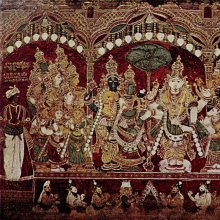Robber: 1 definition
Introduction:
Robber means something in the history of ancient India. If you want to know the exact meaning, history, etymology or English translation of this term then check out the descriptions on this page. Add your comment or reference to a book if you want to contribute to this summary article.
Images (photo gallery)
India history and geography
Source: Singhi Jain Series: Ratnaprabha-suri’s Kuvalayamala-katha (history)Robbers were commonly depicted on the Saṃsāracakra paintings (representing scenes of human life) in ancient India, as mentioned in the Kathās (narrative poems) such as Uddyotanasūri in his 8th-century Kuvalayamālā (a Prakrit Campū, similar to Kāvya poetry).—Page 185.21 f.: Here follows a description of a printed scroll illustrating the Jaina conception of saṃsāracakra. [...] The saṃsāra-cakra illustrated the three worlds of hell, human world and the world of gods. [For example:] then a way-farer captured by the robbers and subjected to various tortures, torments, splitting, hanging, scorching etc.

The history of India traces the identification of countries, villages, towns and other regions of India, as well as mythology, zoology, royal dynasties, rulers, tribes, local festivities and traditions and regional languages. Ancient India enjoyed religious freedom and encourages the path of Dharma, a concept common to Buddhism, Hinduism, and Jainism.
See also (Relevant definitions)
Full-text (+414): Hodri, Paripanthika, Macala, Vilumpaka, Vihartri, Caura, Saranikaghna, Prasahyacaura, Pataccara, Paraskandin, Dassu, Viloptri, Daroda, Mushivan, Steyin, Malimlusena, Lunthaka, Taskara, Darodekari, Hantri.
Relevant text
Search found 156 books and stories containing Robber; (plurals include: Robbers). You can also click to the full overview containing English textual excerpts. Below are direct links for the most relevant articles:
The Jataka tales [English], Volume 1-6 (by Robert Chalmers)
Jataka 374: Culladhanuggaha-jātaka < [Volume 3]
Jataka 63: Takka-jātaka < [Book I - Ekanipāta]
Jataka 311: Pucimanda-jātaka < [Volume 3]
The Great Chronicle of Buddhas (by Ven. Mingun Sayadaw)
Biography (8): Kātiyāni < [Chapter 45b - Life Stories of Female Lay Disciples]
Moggallāna Mahāthera’s Attainment of Parinibbāna < [Chapter 43 - Forty-one Arahat-Mahatheras and their Respective Etadagga titles]
Chapter 4 - Renunciaton of Sumedha < [Volume 1.1]
Mahabharata (English) (by Kisari Mohan Ganguli)
Section CXXXV < [Apaddharmanusasana Parva]
Section CLXVIII < [Apaddharmanusasana Parva]
Section CLXXII < [Apaddharmanusasana Parva]
Manusmriti with the Commentary of Medhatithi (by Ganganatha Jha)
Verse 11.18 < [Section II - The Brāhmaṇa’s Responsibilities and Privileges regarding Sacrificial Performances]
Verse 7.127 < [Section XI - Customs-Duties]
Verse 11.80 < [Section VII - Special Expiation for Special Offences: (a) For Killing a Brāhmaṇa]
Kautilya Arthashastra (by R. Shamasastry)
Chapter 5 - Detection of Youths of Criminal Tendency by Ascetic Spies < [Book 4 - Removal of Thorns]
Chapter 4 - Molestations, Obstructions and Financial Troubles < [Book 8 - Concerning Vices and Calamities]
Chapter 11 - The Institution of Spies < [Book 1 - Concerning Discipline]
Heimskringla (by Snorri Sturlson)
Part 12 - Harald's Expedition to Palestine < [Chapter IX - Saga Of Harald Hardrade]
Part 230 - Bishop Sigurd's Speech < [Chapter VII - Saga Of Olaf Haraldson]
Part 15 - The Tenth Battle < [Chapter VII - Saga Of Olaf Haraldson]
